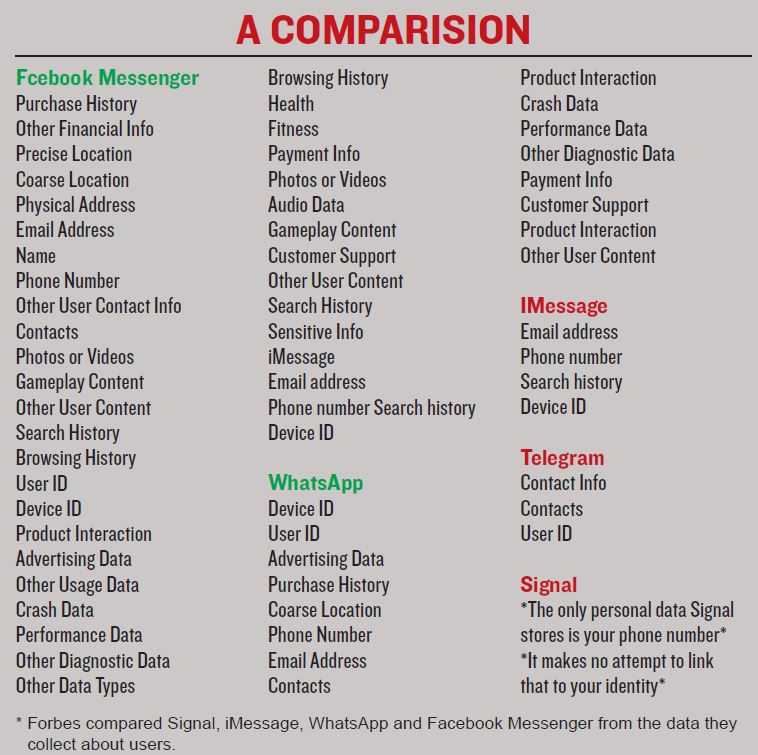 Whatsapp is updating its terms and privacy policy, many people are going ahead and accepting the new terms and conditions but there is equally a good number that is embracing new platforms. The notice talks about three key updates that affect how WhatsApp processes your data, how businesses can use Facebook-hosted services to store and manage their WhatsApp chats, and how WhatsApp will soon partner with Facebook to offer integration across all these products. It further reveals that these changes will go into effect on February 8, and users will have no choice but to accept these changes if they wish to continue using WhatsApp.
Whatsapp is updating its terms and privacy policy, many people are going ahead and accepting the new terms and conditions but there is equally a good number that is embracing new platforms. The notice talks about three key updates that affect how WhatsApp processes your data, how businesses can use Facebook-hosted services to store and manage their WhatsApp chats, and how WhatsApp will soon partner with Facebook to offer integration across all these products. It further reveals that these changes will go into effect on February 8, and users will have no choice but to accept these changes if they wish to continue using WhatsApp.
Significantly, Tesla CEO, Elon Musk, on January 7 urged users to “Use Signal” and the result was for everyone to see because Signal tweeted that verification codes were delayed across several providers because many new people were trying to join the messaging platform. The company has also shared a guide informing users to move their groups from other messenger apps to Signal using a group link. Signal did not explicitly name WhatsApp here but the message was quite clear.
Surely, encrypted instant messaging app Signal is reporting a surge in new signups and new users, as WhatsApp users are migrating bases. Signal, an instant messaging app developed by the nonprofit Signal Foundation, is a rival for instant messaging apps owned by Facebook, including WhatsApp and Facebook Messenger. The new WhatsApp Privacy Policy and Terms of Service that makes it even more clear that user data is being shared with Facebook’s other apps and services. A similar change had been announced by WhatsApp in July 2020 but then it gave the option to not have your WhatsApp account information shared with Facebook. But now there is no such option. If you agree to the changes, the information WhatsApp will share with other Facebook companies includes your account registration information, your phone number, transaction data, service-related information, information on how you interact with others, mobile device information and your IP address.
The new policy does not give a choice to stay on the platform as it keeps popping up and blocks users until the terms are accepted. The WhatsApp message for users notes at the end reads, “By tapping AGREE, you accept the new terms and privacy policy, which take effect on February 8, 2021. After this date, you’ll need to accept these updates to continue using WhatsApp. You can also visit the Help Center if you would prefer to delete your account and would like more information.” Regarding third-party service providers, WhatsApp’s privacy policy now mentions that it is sharing information with “third-party service providers and other Facebook Companies in this capacity.”
WhatsApp does elaborate on how the information exchange with Facebook will be utilized to help improve infrastructure and delivery systems, to improve Facebook’s services and users experiences around them, such as making suggestions for users, personalizing features and content, helping users complete purchases and transactions, and showing relevant offers and ads across the Facebook company products, to provide integrations which enable users to connect their experiences. The new privacy policy also expands on global operations and data transfer, including how some information is shared “internally within the Facebook Companies and externally with our partners and service providers, and with those with whom you communicate around the world, in accordance with this Privacy Policy.”
Now it is up to you, either agree to the set of conditions allowing sharing of your data information or leaving WhatsApp. Whatsapp can collect data about your usage, the kind of phone you use, even locations. WhatsApp can keep the message in encrypted form for 30 days as it tries to deliver it, after that, the message will be deleted. No doubt WhatsApp can know a lot about you and all that information can potentially be used to create your unique profile, then the profile goes to Facebook and it can share information with other companies. How big the development is can be gauged from the fact that in India alone, Facebook has more than 200 million active subscribers which means potential data on 200 million citizens as to what they buy or spend and their preferences.
The box elaborates how our data is being used for readers to decide as to what to choose.
letters@tehelka.com













